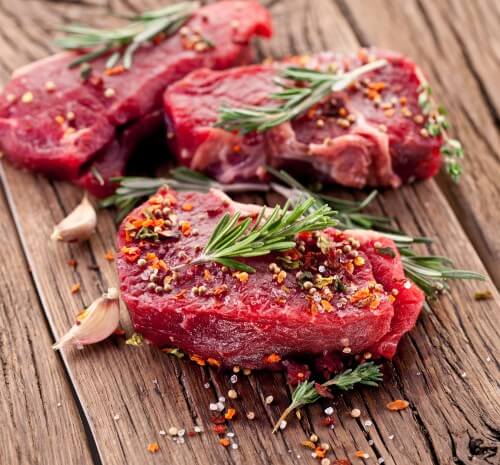The researchers also suggest educating the population and improving the supply chain of food products in general and meat in particular, in order to reduce waste.

To ensure a future supply of food and to help prevent global warming, the global consumption of meat must decrease, researchers claim from the Universities of Cambridge and Aberdeen in Great Britain.
The researchers claim that "if meat production and consumption continue to increase at the current rate, greenhouse gas emissions will increase by 80%, which will make it difficult to reach the global goal of limiting emissions.
The researchers call to be satisfied with eating no more than two servings of red meat and seven dairy servings per week. According to the researchers, the balanced diet in the study is achievable by most people, limiting to two servings of meat of 85 grams and five eggs per week, as well as a portion of chicken or turkey (the size of which was not specified) per day. "This is not a radical vegetarian argument, it is an argument about eating meat in moderate amounts as part of a healthy and balanced diet," says Prof. Kate Richard from Cambridge, "Managing consumption, for example through health education, will provide a double advantage - maintaining a healthy population, and a critical reduction in pressure on the environment."
But the call comes at a time when hamburger stands are growing on every corner. The study shows that more and more people are "adopting an American menu and food fashion", and thus the consumption of meat and dairy products increases significantly.
If the process continues - more and more plantations and fields that are currently used to grow food will be converted to use domesticated animals, and the farmers of the world will not be able to meet the demand for food. More forests will be cut down which will increase carbon dioxide emissions. More domestic animals will cause more emissions of methane as well as extensive use of fertilizers. These will also increase global warming.
Lead researcher Bojana Bajzelj from the University of Cambridge says that "the basic laws of biophysics must not be evaded", "the average efficiency of farm animals in converting plant food into meat is less than 3%". As the demand for meat increases, more agricultural fields are converted to food crops for farm animals that will provide meat for the human population. At each stage the loss increases "and the more meat we eat, the conversion of plant food to meat becomes less efficient." These processes cause an increase in agricultural areas and the emission of more and more greenhouse gases. The researchers say that "the fault is not in the agricultural methods but in the choice of food by the people".
The researchers argue that the situation can be significantly improved by helping farmers in developing countries get the best crops from their fields. Another big improvement will be when the human population learns to stop wasting food. On top of that is convincing people to eat healthier food. These three changes can cut greenhouse gas emissions in half compared to the level measured in 2009.
Another contributor to the article, Prof. Pete Smith from the University of Aberdeen says: without changes in the food chain, it will not be possible to meet the goals of reducing greenhouse gas emissions, and in order to encourage sustainable agriculture we are required to think about what we eat.
Reducing food waste and managing meat consumption in a balanced diet is an essential option without regrets, says Bajzelj.
This is another study that warns of the global risks that arise from eating meat and intensively produced dairy products. Scientists worried about warming join doctors who are worried about the obesity epidemic and come to the same conclusion: "Meat consumption must be reduced."
But convincing the population of the health and environmental need is a difficult task, since more and more people "vote" with their wallets and give their voice to the American hamburger stands.
- On the same topic on the science site
- Research: 10 times more useful to consume chicken meat and eggs instead of beef
- Meat production with less damage to the atmosphere
- A day without meat?

5 תגובות
Yigal
The 54% also includes the vegetarian food industry, doesn't it? Anyway, where did this number come from?
Wow, and researchers were needed for this??? Studied for years at university just to state the obvious. very impressive. Greenhouse gas emissions from industrialized farm industries are 54% greater than all vehicles in the world combined. More than cars and ships and planes and trucks and trains all put together. The weapons of mass destruction are not the atomic bomb, they are our knives and forks.
Genetically altered?
No - Al Gore did not claim that. Say, can't you come up with one argument against warming that isn't false?
Here is the quote of what Gore did say:
Another new study, to be presented by US Navy researchers later this week, warns it could happen in as little as 7 years
You see? There is truth... and there is another truth (which we usually call a lie).
I have not heard such a prediction from Al Gore, the lunatics who are trying to sabotage the important fight against global warming are defeating you with nonsense that the connection between them and reality is purely coincidental, the main thing is to prove their thesis.
And Al Gore claimed that computer models unequivocally predict that the ice at the North Pole will melt completely in the summer of XNUMX... Niels Bohr predicted it "We are entering a dark age in science..."